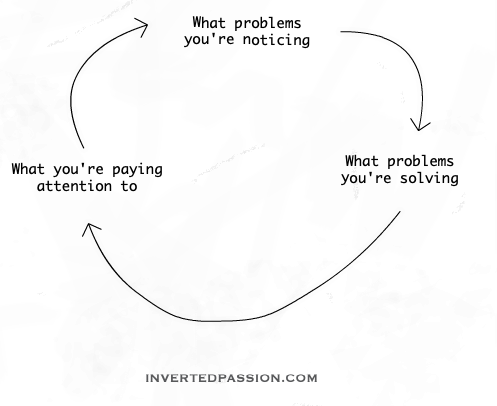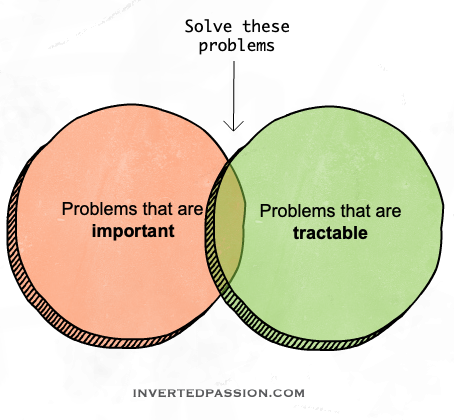Picking problems to solve is a function of attention. Wherever and whatever you’re paying attention to is going to reveal problems in that domain to you. Solving such revealed problems is going to absorb you and will reveal even more problems worth solving in that domain.
So this creates kind of a feedback loop.

Because every domain of life has such richness, it’s easy to get lost in this feedback loop and spend an entire life solving problem after problem in that domain. In fact, this is what (traditionally) is meant by a career. There’s nothing wrong with going deeper into a niche if one is mindful and conscious of it. However, in my experience, few people consciously choose what problems to solve because very few consciously choose what to pay attention to.
More likely is the opposite situation where one’s attention is grabbed by something either by chance or by entities that are into attention-grabbing business (media, influencers, parents, friends). The incredible thing is that such attention-grab determines what problems they’re able to spot in the world.
An illustrative example of this is startups by college students. They often revolve around college problems such as dating, internships, jobs, and so on. Take Facebook. It started because Mark Zukerberg wanted to create a student directory that will ultimately help improve his dating life. In my case as well, my first two startups revolved around college life – one was a directory of college bands in India and the other one was a student projects platform. Were they the best investment of my time? No, but those were the only problems I could recognize back then because my attention was absorbed by the world created by my college experience.
I now understand that given the finite time, energy, and bandwidth that we all share, solving important problems is a better investment of life than solving whatever problems jump to attention. Why so? It’s because all problems in sufficient detail become interesting and fun. And if the amount of fun solving a problem is more or less the same, I should prioritize solving problems that lead to a bigger and non-trivial improvement in the world (rather than solving those that lead to a smaller, trivial improvement).
So, to judge a problem’s importance, look at the expected improvement in the world if it is solved.
But, how to judge what is an improvement in the world? On what scale should it be measured? Well, to do that you need to develop your beliefs about what is “good” or “bad” in the world. In absence of your own beliefs, you’ll adopt someone else’s beliefs that can lead to you investing time in solving problems that you deem unimportant in retrospect.
To get clarity on what you consider as an improvement in the world, I recommend sitting down and writing your moral code. The gap between what world we have today and what world you consider a good one will help reveal important problems to you. For example, I prefer a world with less suffering in the world and that immediately reveals tons of important problems such as animal farming, depression, child mortality, and so on.
Your moral code can absolutely differ from mine and we don’t have to agree on what problems are important. The important thing is to know what problems are important mindfully instead of going about solving whatever jumps to your attention via various influences around you (social media, colleagues, industry influencers, media).
To sum up, most problems differ in their importance but most problems are similar in how much fun you can expect solving them. So why not choose to solve important problems?
One caveat here is that it’s easy to obsess over trying to find the most important problem worth solving. While such an exercise is fruitful in giving clarity about where to spend one’s time, it shouldn’t lead to inaction. The most obviously important problems such as climate change, poverty, or cancer are also the ones where any single individual has a limited impact potential. If many smart and motivated people have tried solving a problem and have not entirely succeeded, you should, by default, assume that you’ll have a similar outcome. It’s good to be confident, but not good to be cognitively biased. Be a good Bayesian and understand that the odds are against you when it comes to solving cancer or climate change. These are complex phenomena with no straightforward solutions.
This recommends the following thumb rule: choose problems that are at an intersection of importance and tractability.

The may sound obvious but it’s difficult to be at the intersection. Tractable problems are appealing because they fall in our comfort zone (but do not necessarily improve the world). Important problems are appealing because they promise a large improvement in the world (but are not necessarily solvable).
What helps to choose tractable, important problems is to consider that the importance of problems is not a precise mathematical ordering but it’s a broad label that can be applied to many, inter-related problems. For example, even if you can’t solve climate change by yourself but can save a forest from getting razed or invent a more efficient battery, you should consider that as a worthy investment of life. You didn’t sit on your ass getting demotivated by the difficulty of solving climate change, making no difference to what you consider important. Neither did you spend your time working on a minor problem in a relatively unimportant niche (from your own belief system’s point of view).
You picked the biggest tractable problem in a domain you consider important and solved it. That’s what really matters and you should be proud of it.
Remember: you have one life; mindfully choose to work on the most important problems that you can solve.
This essay is part of my book on mental models for startup founders.
Join 150k+ followers
Follow @paraschopra